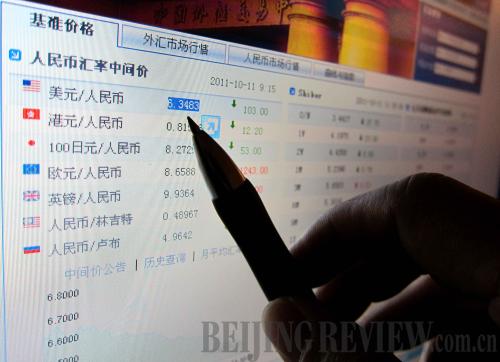|
 |
|
CONTINUOUS APPRECIATION: The central parity rate of the yuan hit 6.3483 per U.S. dollar, as shown on the official website of China Foreign Exchange Trade System on October 11, 2011 (GONG LEI) |
It should be noted that the yuan's appreciation will not save U.S. manufacturing sector; instead, it may affect the employment of other industries. Because the yuan's appreciation means China will dramatically reduce purchases of U.S. assets. With the reduction of the huge capital inflows from China, the United States will face the pressure of raising interest rates. At that time, the employment situation will deteriorate.
In June 2005, the Asian Development Bank released a report, forecasting the situation after the yuan's appreciation, based on the model of Oxford Economics Forecasting. The report showed that even if the yuan appreciates significantly, it will only affect the economies of China and its neighboring countries, but have little effect on global economic imbalances or the U.S. financial and trade deficits.
The result of the report has also been proved by reality since China's exchange rate reform.
China started its exchange rate reform in 2005. On July 21, 2005, the People's Bank of China, the central bank, abandoned the decade-long peg to the U.S. dollar and adopted a managed floating exchange rate regime based on market supply and demand with reference to a basket of currencies.
Since then, the yuan started its continuous appreciation process against the dollar. As of the end of September 2011, the yuan had appreciated 30 percent against the U.S. dollar. But the U.S. trade deficit has not decreased at all. Instead, the deficit keeps growing.
It can't be denied that trade imbalance does exist between China and the United States. But the key point is this imbalance results from the U.S. fiscal policy and consumption habits, from the two countries' different macroeconomic structures due to their different development stages, and from the U.S. hi-tech export restrictions against China.
The yuan exchange rate is not the root of the imbalance. It seems that Chinese products are competitive on the global market because of the undervalued yuan. In fact, the main reason for the low price of Chinese products is China's low labor costs.
As is known by all, the rapid appreciation of a currency can bring great harm. The quick appreciation of the yuan will result in a rapid decline in China's exports. Export-oriented enterprises will go bankrupt. Along with this will come unemployment, lower family income and shrinking consumption.
Given the imbalance of the Chinese economic structure, if the yuan appreciates slowly, China's economic rebalancing can be realized smoothly. During the process, China's manufacturing industry can absorb new domestic customers to make up for its loss of overseas customers. And the unemployment rate can also be controlled.
Therefore, in the future, China's yuan exchange rate reform will adhere to the "active, progressive and controllable" principle, trying to minimize the possible negative effects.
To achieve this goal, first of all, China needs to ensure fluctuation range within control. China also needs to focus on its domestic situation, trying to make the fluctuation of the yuan in line with the demands of the Chinese economy.
A gradual approach must be adopted, too, so that enterprises can have enough time to make structural adjustments and conquer the negative effects. In this way, China can promote an orderly industry shift and upgrade, so as to maintain the overall competitiveness of its enterprises in the global market and guide employment toward the service sector.
Supervision and administration of short-term speculative capital should also be strengthened, so as to prevent the impacts of the large-scale inflow of hot money on the domestic financial system.
Moreover, it should be emphasized that, as the core of a country's monetary policies, the exchange rate should never be determined by other countries.
The author is an associate researcher with the Institute of World Economic Studies at the China Institutes of Contemporary International Relations | 